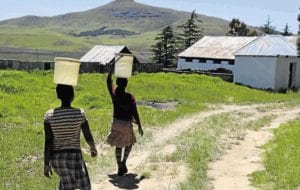Poor people living in rural areas are the most vulnerable to the impacts of climate change, despite having contributed least to its causes.
This is according to Magezi Mhlanga, Chief Town and Regional Planner: Environmental Planning from the Department of Rural Development and Land Reform. Speaking at the National Climate Change Response Dialogue held earlier this month, Mhlanga pointed out that adaptation has received less attention within the national and international policy framework than mitigation. In his presentation titled The Impact of Climate Change on Rural Settlements, Mhlanga welcomed the idea of a 2016 National Adaptation strategy, to help poor rural communities to moderate the harm they would experience as a result of climate change and exploit any beneficial opportunities. Highlighting key elements to be included in the strategy, he emphasised that climate change related vulnerability must be understood within a local context. He pointed out that climate change adaptation planning must be shaped by local participation and built on local capabilities.“Community driven adaptation responses must place control and resources in the hands of local communities and view rural people as partners and assets in development,” noted Mhlanga.
“Responses should leverage the resources, efforts and capabilities of local areas including indigenous knowledge systems. They should protect ecosystem services to rural communities and strengthen disaster preparedness and response,” he added. Mhlanga listed government agencies, municipalities, traditional authorities, community structures, academic institutions, business sector, unions and NGOs as some of the key role players in developing a National Adaptation Strategy. In developing the strategy sector plans, he suggested key role players look to municipal plans, statistics and research finding from various organisations, climate data from various institutions and direct sourcing from the community for sources of information. In closing Mhlanga reiterated the need for a community based approach that role players can use as a method of verifying some of the scientific work.







